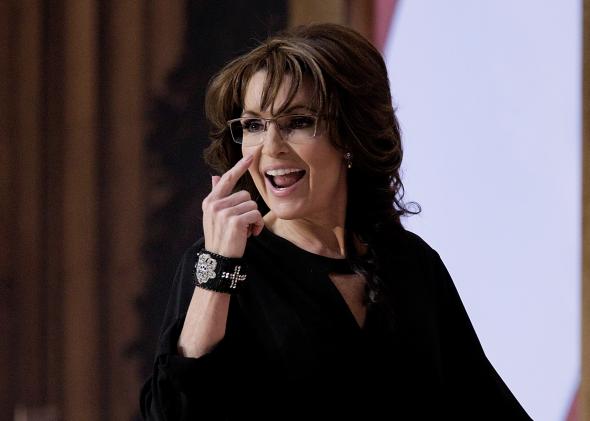Do Conservatives Have a Feminine Bias?

Photo by T.J. Kirkpatrick/Getty Images
For the first few weeks after she was named John McCain’s vice presidential running mate, Sarah Palin was more popular than either McCain or Barack Obama. Conservatives swooned.
It was, of course, a disaster, and Palin has long since become a rather cartoonish figure circling the Republican orbit. It is hard to believe that she was once taken with such seriousness.
But a new study from Jonathan Freeman of Dartmouth College and his colleagues, just published Thursday in Social Psychological and Personality Science, offers some clues about why this might have been. Looks count in politics. And for conservatives, the paper’s authors found, how feminine a female candidate appears correlates to how likely she is to win an election. Interestingly, this correlation doesn’t hold for liberals.
The researchers reached this conclusion by conducting two experiments. In the first, study participants were shown pictures of the faces of largely unknown candidates, both male and female, from Senate and gubernatorial races between 1998 and 2010. Researchers tracked how long it took for each participant to select whether the face was male or female upon seeing the image. A longer lag in selecting each gender indicated greater deviation from the perceived gender. That is, a face identified as female in two milliseconds would be considered more feminine in appearance than one that took five milliseconds.
The participants were then told that the faces they had been shown were political candidates, and asked whom they would vote for based solely on the photos they’d seen. For these hypothetical votes, men received the most support, regardless of how masculine their faces were rated. Women received fewer hypothetical votes overall, and those perceived to be least feminine garnered the fewest intended votes.
The second part of the study plotted a participant’s facial preferences against geographical location and actual electoral outcomes. In more conservative states, the researchers found, female candidates with very feminine faces either won by greater margins or lost by smaller ones. A statistically significant correlation between initial perception of gender and results could therefore be shown. This was true no matter how attractive or competent a politician was separately thought of.
So conservative voters (or voters living in a more conservative culture), it seems, may collectively be influenced by a subtle bias that is less pronounced or absent in liberal ones. Why this might be is unknown, but there are a number of plausible explanations. Much work has been done on the psychology of political identification indicating that people who are conservatives tend to resist incorporating new information into their worldview, and be more averse to uncertainty. So it is possible that even a slight, temporary uncertainty about how to perceive someone could color a person’s likelihood of voting for a candidate. For people who view gender along rigid guidelines, this matters.
Sarah Palin, with her beauty queen looks, arguably stirred an innate conservative trust. Of course, not all pageant gals-turned-politicos are conservative, but it seems like the Republican ones have been more successful. In Palin’s case, even conservatives lost interest when her remarks that the difference between herself and an attentive canine was “lipstick” proved rather true.
